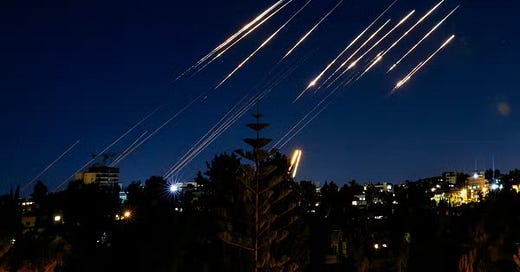Analyzing Iran-Israel Conflict Dynamics On The Brink Of War
The message is that Israel — and the West — is not interested in a genuine agreement but in seeking unconditional surrender.
The Middle East stands close to total war as military exchanges between Iran and Israel grow in strength following the targeted assassination of senior Iranian military officials and scientists. On the night of June 13, Israel launched Operation Rising Lion, targeting Iran’s nuclear program this was followed by an Iranian response less than 24 hours later with the exchanges continuing by the publishing of this article on June 17. Israel’s strategy shifted from a forthright military decapitation attempt to a broader approach of further provoking Tehran by inflicting mass civilian casualties in a bid to get the United States into the conflict.
The Assassination Campaign And Its Aftermath
The killing of key Iranian generals and scientist in mid-June by Israel — with probable US support — represents a clear decapitation strategy aimed at destabilizing Iran’s military and political leadership. In response, Iran has launched missile, and drone strikes against Israeli positions to deter further attacks, while Israel has retaliated with airstrikes inside Iran, including against civilian infrastructure. The cycle of violence risks spiraling out of control, particularly as Israel, unable to decisively cripple Iran’s underground nuclear sites or its underground storage of ballistic and hypersonic missiles, may be calculating that large-scale civilian casualties could force Iran into an overreaction.
Israel’s military calculus seems to hinge on the assumption that any massive Iranian retaliation — such as a direct missile barrage on Israeli cities — would compel the United States to intervene on its behalf. Given Washington’s unwavering alliance with Tel Aviv, an existential crisis for Israel could leave the U.S. with no choice but to enter the conflict, potentially leading to a full-scale regional war. While Iran has so far calibrated its responses to avoid all-out war, a significant escalation in civilian deaths could push Tehran toward a more aggressive stance.
The Western media narrative is that Iran must "return to negotiations and de-escalate tensions" but this framing deliberately ignores a critical fact that Iran was already negotiating in good faith when the US and Israel chose sabotage over diplomacy. Despite years of sabotage (such as the Stuxnet cyberattack and several assassinations of scientists thru out the years), Iran has steadily advanced its uranium enrichment capabilities. The assassination of Iranian officials, covert attacks on nuclear facilities, and economic warfare have all undermined the very de-escalation protocols that the West claims to desire. Now, after systematically destroying any basis for trust, Washington and Tel Aviv demand that Tehran come back to the table as if nothing happened.
Iran Has Done The Impossible Trying To Trust The West
The 2015 Joint Comprehensive Plan of Action (JCPOA) was supposed to be a diplomatic breakthrough with Iran complying with strict limits on its nuclear program in exchange for sanctions relief. Yet even as Tehran adhered to its obligations, the US unilaterally abandoned the deal in 2018 under Donald Trump, reimposing crushing sanctions. Israel never stopped escalating its shadow war of assassinating, sabotaging facilities, and launching cyberattacks. The Biden administration expressed willingness to revive the JCPOA, and even the Trump administration floated ideas similar to those in the JCPOA during recent negotiations yet nothing came of it.
The killing of top Iranian commanders—such as the recent strike on IRGC officials—proved that Western "diplomacy" was always a smokescreen for regime-change efforts. There is a historical trend in these sabotages that’s reminiscent of the Stuxnet virus deployment in 2011, the assassination of Mohsen Fakhrizadeh in 2020 (a key scientist) and the sabotage of Natanz Nuclear site, which all occurred while Iran was engaged in talks. The US and Israel have demonstrated that their strategy is not containment, but decapitation, and demand concessions while actively working to destabilize Iran’s government. The message is that Israel — and the West — is not interested in a genuine agreement but in seeking unconditional surrender.
Not Diplomacy But A Trap?
By provoking Iran into retaliation, Israel and the US create the pretext for harsher sanctions or even direct military intervention. The goal is not to prevent conflict but to control its narrative, framing Iran as the aggressor despite being the target of relentless covert warfare. If negotiations can be undermined by assassinations and sabotage, what is their value? If sanctions remain even when Iran complies, what incentive is there to cooperate? If Israel can bomb sovereign Iranian territory with impunity, there is no incentive for Tehran believe in Western "diplomacy"? True diplomacy requires a degree of good faith, not the constant threat of assassination and economic strangulation.



